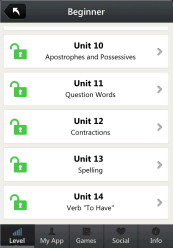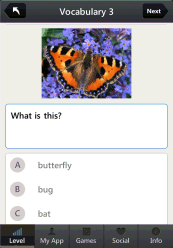English Grammar - Pre-Intermediate
Question Tags
Go To Quizzes >>> Question Tags
Question tags are used in English as a simple way of asking questions in conversation.
Question tags go at the end of a sentence and we use positive ones to finish a negative sentence and, conversely, we use negative ones to finish off positive sentences.
That was a great meal, wasn't it?
Tony is married, isn't he?
She isn't very pretty, is she?
They don't smoke much, do they?
To form the question tag, you must use the same auxiliary verb that is used to make the question form of the relevant tense.
English Learning Lounge - iOS and Android Apps |
||

|
Our app for both Android and iOS to help you improve your English!
|

|
Examples:
The continuous tenses use "be":
You were fishing yesterday, weren't you?
I'm doing this correctly, aren't I?
The simple tenses use "do":
You went to the cinema yesterday, didn't you?
She loves her wine, doesn't she?
The perfect tenses use "have":
He's never been out of the country, has he?
I've been accepted, haven't I?
And the modals stay the same:
They shouldn't make that strange noise, should they?
You can't come out tonight, can you?
We'll see you tomorrow, won't we?
The meaning of question tags can change slightly depending on whether your voice rises or falls at the end of a sentence. If your voice falls, you are only checking information, confirming what you already believe. But if your voice rises on a question tag, this makes it more of a real question.
Compound Nouns
Go To Quizzes >>> Compound Nouns
Compound nouns are where two (or more) nouns are put together to mean one thing.
a kitchen table
a shopping centre
a video player
When this happens, the first noun is acting like an adjective to give us more information on the second noun. The first noun, like an adjective, tells us what type of table it is. What type of centre, what type of player?
We know that it is a kitchen table, for example, and not a dining room table. A shopping centre and not an industrial centre. It is a video player and not a CD or cassette player.
If you know this, it will help you remember and even create nouns of your own.
What is the difference between these two?
A phone card and a card phone.
Remember what we read before about the first noun acting like an adjective. The first thing is a card. The first word, phone, tells us what type of card it is. The second thing is a phone. The first word, card, tells us what type of phone it is - those that accept only cards and not money.
What about these two?
Film music and music film
This one is more difficult. If we use the same logic though we can understand that the first, "film music", is the type of music we hear in a film. Maybe orchestral. The second, "music film", is a film about music.
The second word tells us what the object is.
The first word acts as an adjective and describes what type of object it is.
'So' and 'Such'
Go To Quizzes >>> So & Such
So and such are used to emphasise nouns and adjectives.
It was so hot yesterday that I went swimming down at the beach.
That was such a good film, Tracy. Who was the main actor?
We use:
| So | + | Adjective | or | Adverb |
He was so quick, he won the race easily.
My mother spoke French so well!
but
| Such | + | Noun | or | Adjective and Noun |
He drove such a fast car that he won easily.
Such films always make me cry.
So / Because
So and Because are used to talk about reasons and causes for connected events.
Consider this little story:
Tom gets up. He sees the weather forecast. "It's going to rain," they say. He decides to take his umbrella. Later on, it rains, but Tom is smiling under his umbrella!
They said it was going to rain, so Tom took his umbrella.
Tom took his umbrella because he saw the weather forecast.
Tom didn't get wet because he had his umbrella, so he was happy!
